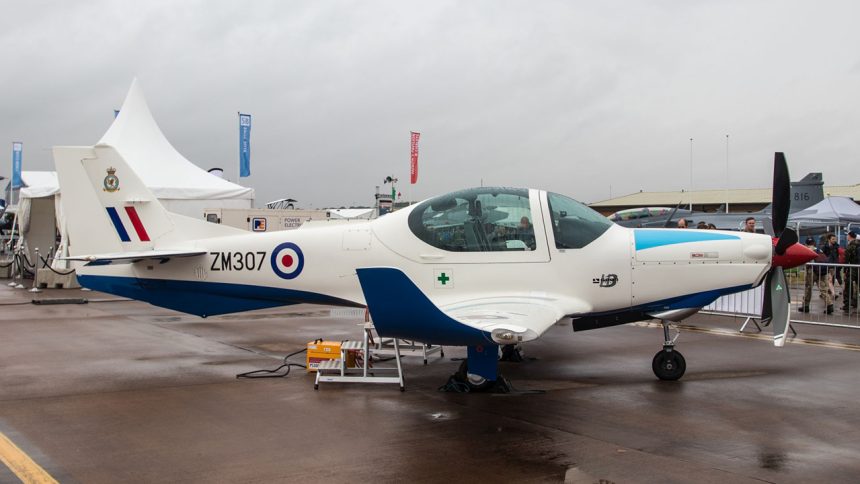The acquisition is to meet the new training requirements, following the modernization of the Royal Canadian Air Force’s front-line equipment and weapons systems.
Bill Blair, Head of the Canadian MoD, during the annual CANSEC defense and security trade show, announced that RCAF (and other branches of the Canadian Armed Forces, CAF) will receive new, state-of-the-art platforms to secure the military training needs.
When it comes to the RCAF’s (Royal Canadian Air Force) training requirements, Blair announced that a contract that will remain valid for 25 years would be signed with SkyAlyne Canada Limited Partnership for the Future Aircrew Training (FAcT) Program. According to the official release issued by the Ministry of Defense, the contract is worth CAD 11.2 billion, taxes included (USD 8.22B).
The goal of the agreement is to cover the acquisition of more than 70 training aircraft split into five, type-specific fleets. The types to be acquired include:
- Grob G120TP,
- Pilatus PC-21,
- Beechcraft King Air 260,
- Airbus Helicopters H-135
- De Havilland Dash 8-400, equipped with a mission training system in the cabin.
Although procurement of training assets may not be as exciting, as the acquisition of new front line tactical aircraft is, this acquisition is a part of the largest recapitalization of the RCAF since the Second World War, the MoD’s release states.
Major investments in equipment and training! We’ve awarded a contract for the Future Aircrew Training (FAcT) Program and two contracts for the Logistics Vehicle Modernization (LVM) project. Learn more: https://t.co/wOmctrvq2v pic.twitter.com/wZT9u3cxKL
— National Defence (@NationalDefence) May 29, 2024
The new FAcT contract will replace the current in-house training services provided by the RCAF and two existing contracts: a CAD 4.6B (USD 3.38B), 25-year agreement with CAE Military Aviation Training for the NATO Flying Training in Canada program, expiring in 2028, and a CAD 1.8B (USD 1.32B), 22-year contract with Allied Wings for the Contracted Flying Training and Support program, ending in 2027.
“Nothing is more important than our people. We must modernize our training systems as we are modernizing our front-line equipment and weapons systems. The Future Aircrew Training program will do that by incorporating the latest training concepts and technologies and adapting to emerging trends to ensure Royal Canadian Air Force personnel can operate and win in highly contested and increasingly complex theatres of operation”, Lieutenant-General Eric Kenny, Commander, Royal Canadian Air Force, cited by the MoD’s release, said.
Notably, the Canadian government procured or upgraded about 140 new aircraft since 2022 alone, including the F-35A and the P-8A.
The procurement of training assets is a logical next step to follow. Crew training requirements grow, and any new platform in service usually entails new challenges within that realm. This shows in the fact that the contract is not limited to the training airframes, as it will also include classroom instruction, simulator and flight training, as well as numerous on-site support activities for prospective RCAF Pilots, Air Combat Systems Officers, and Airborne Electronic Sensor Operators, the release issued by the MoD reads.
Training under this new contract is expected to still take place at key RCAF Wings in Saskatchewan and Manitoba: 15 Wing Moose Jaw, Saskatchewan, Portage la Prairie, Manitoba, and 402 Squadron, at 17 Wing Winnipeg, Manitoba. Spring of 2029 is said to be the starting date for the program and is said to offer the potential to create or maintain 3,400 jobs and contribute CAD 405 million (USD 297M) annually to Canada’s gross domestic product over 25 years.
Retirement of the CT-155 Hawk
The contract does not fill the gap in the advanced jet training of the RCAF following the retirement of the CT-155. On March 8, 2024, the RCAF announced it was retiring its fleet of CT-155 Hawk advanced trainer aircraft after 24-year service and beginning of a period of hiatus for the RCAF’s fixed wing training ops.
During its hiatus, the RCAF will collaborate with its allies to train future fighter pilots. A key component of this interim strategy involves the Euro-NATO Joint Jet Pilot Training (ENJJPT) program at Sheppard Air Base, Texas. Additionally, future RCAF pilots will be sent to other NATO countries with similar programs, such as the Fighter Lead-in Training (FLT) in Finland and the International Flight Training School in Italy. Officials have announced that by 2025, there will be two instructors and six students in Italy. The ENJJPT in the US, which the RCAF has participated in since its inception in 1981, uses the USAF’s updated T-38 aircraft, with up to seven students being sent under the program. Finland, which also operates the F/A-18, will offer RCAF students another variant of the Bae Hawk as part of their training.
The first cadre of RCAF pilots trained at the IFTS at Decimomannu Airbase (or “Deci”), in Sardinia, Italy, completed the LIFT course, the most advanced phase of the pilot training, in March 2024. The IFTS offers a course based on the T-346 aircraft, which is equipped with modern technologies like Voice Control Inputs (VCI), Helmet Mounted Display (HMD), and an NVG module for night operations training, making it suitable for 5th generation aircraft training.









